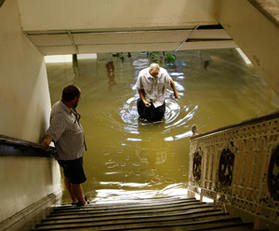Tips to Avoid Flooded Basements

In many parts of the country when stormy weather hits there can be extensive damage caused to property. One of the most common is that of basement flooding. There are multiple ways in which this can happen including living near a water body whose infiltration to ground soil rises above your foundation. Even burst water pipes can cause a big problem and lead to a nasty surprise when you finally get home a few hours later. It can be difficult and expensive, not to mention a hazard, to drain it so prevention is always the best solution to this likely problem.
When you look up more about flooded basements you will find that an important means of avoiding the problem is to reduce the amount of water infiltrating the soil around your house. You can do little about that which falls right next to the wall, but you can lead the water falling on the roof away. By using gutters that lead and extend away from the house and preferably down a slope, you can reduce the chances of flooding. When it is not raining, you should ensure you inspect gutters so they can easily accommodate the flow of water away from the house. Clear any fallen leaves and fix holes that would leak.
Having a power backup system in place in case main power lines go down is also advisable. Many homes have sump pumps that operate to keep water away from the foundation of the home. Without power they cannot function and water will seep in. If your home is prone to water infiltration from surrounding water bodies, then make sure to have a backup pump installed. Also have your sewer pipes regularly checked and a valve installed to prevent the water backing up when the sewers become full or blocked. This is a common occurrence when heavy rainfall occurs.
When you look up more about flooded basements you will find that an important means of avoiding the problem is to reduce the amount of water infiltrating the soil around your house. You can do little about that which falls right next to the wall, but you can lead the water falling on the roof away. By using gutters that lead and extend away from the house and preferably down a slope, you can reduce the chances of flooding. When it is not raining, you should ensure you inspect gutters so they can easily accommodate the flow of water away from the house. Clear any fallen leaves and fix holes that would leak.
Having a power backup system in place in case main power lines go down is also advisable. Many homes have sump pumps that operate to keep water away from the foundation of the home. Without power they cannot function and water will seep in. If your home is prone to water infiltration from surrounding water bodies, then make sure to have a backup pump installed. Also have your sewer pipes regularly checked and a valve installed to prevent the water backing up when the sewers become full or blocked. This is a common occurrence when heavy rainfall occurs.
